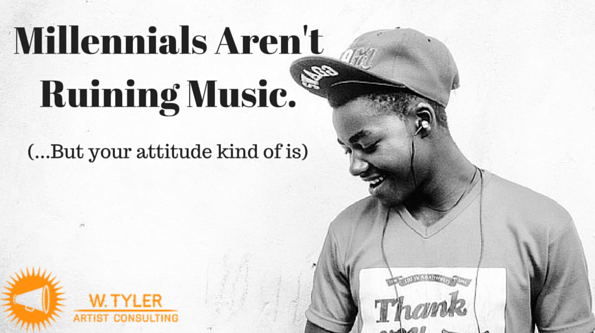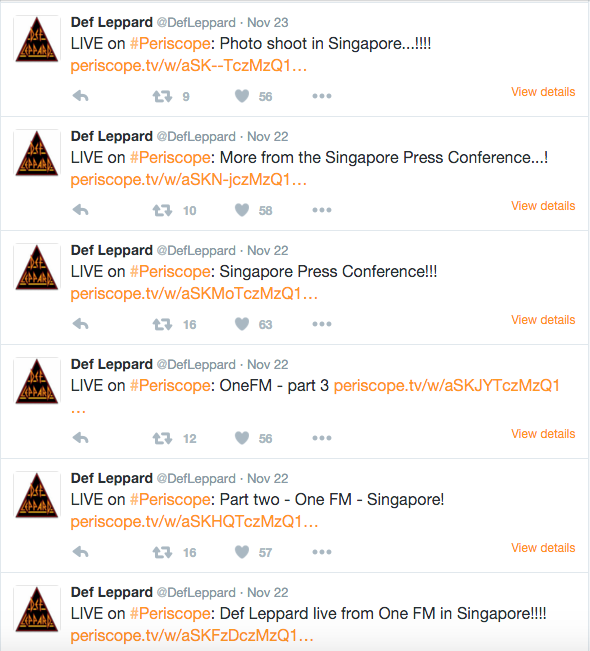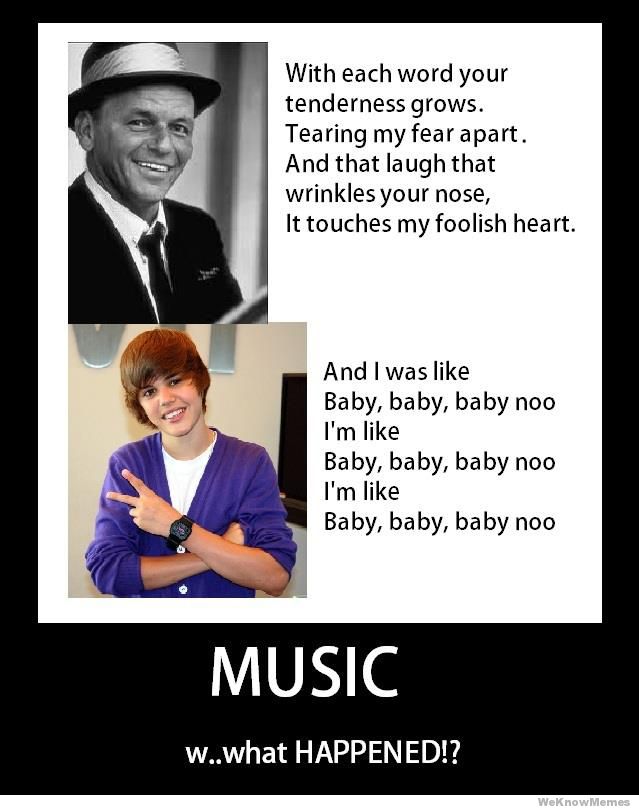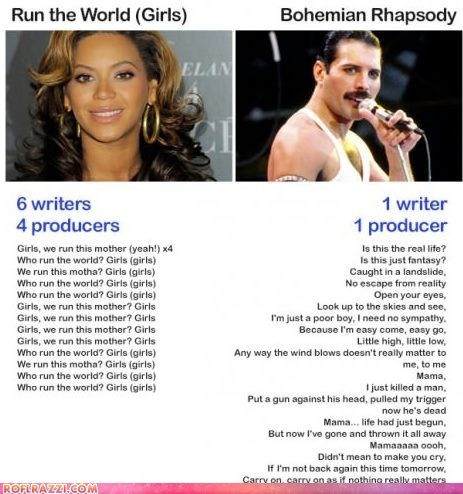I can’t stand music snobs. But what’s worse than a music snob, is a music snob that works in the music industry.
In the past few weeks, I’ve come across an alarming number of articles in music trades and industry websites that have outwardly bashed young artists and millennial music fans.
Some of these– most of these– have been harmless ramblings. However, I can’t help but notice a constant theme of myths that run rampant in these pieces. With artists making 1/5 a penny per stream, and majors essentially owning radio space, the industry is a hectic place as it is.
So.. shouldn’t we be a little more open to new music and genre trends? And embrace young artists rather than imply their tastes and their art generally sucks?
Here are a few samples of articles I came across this month, and why I think they’re a bit over-the-top.
The Return of Real Songs
This topic was discussed in a 2016 Musical Hopes & Predictions article on a favorite industry website of mine. The writer’s hope for 2016 was the following:
“Millennials will come out of their collective fog and realize that what passes for pop music these days – well-produced, pleasant, beat-driven, formula, lyrically repetitive, singsongy, non-melodic music – are not really songs. Real songs – narrative stories with beginnings, middles and ends (as well as the clever bridges) – will stage a comeback, and real songwriters and performers will breathe a collective sigh of relief”.
While I’m sure the writer is very much a competent and professional industry veteran, isn’t this just a bit.. much? To say that a song isn’t real is just silly and well.. overall harmful. As a music industry professional, I support and respect any musician pursuing their art and making an income from it, no matter if someone calls it as “fake” music. Just because I don’t vibe with it, doesn’t mean it sucks.
Just because I don’t like thin crust pizza, doesn’t mean Domino’s should stop selling it.
(Note: I love thin crust pizza, just couldn’t find another analogy there).
But let’s take a look at this “real music” statement further..
Millennials will come out of their collective fog and realize that what passes for pop music..are not really songs.
Hmm. A millennial is defined as someone born in the early 1980’s to early 2000’s, right? So let’s pull up the Billboard charts for 1980 and see what was going on then. Maybe there are “real” songs there.
The number one song in 1980 was Blondie’s Call Me.
It’s a classic, right? Debbie Harry is a legend (and for purposes of this article.. is notably not a millennial). She set the tone for modern pop music, and in some ways was an early adopter to hip hop and R&B. I wouldn’t call her a fake artist by any means. But according to the above definition of “real music”, well damn, I guess Call Me isn’t a “real pop track”.
Color me your car
Color me your color, darling
I know who you are
Come up off your color chart
I know where you’re comin’ from
Call me, call me any, anytime
Call me (call me) my love
You can call me any day or night
Call me
Beat driven? Yep. I’d even say an iconic beat, really.
Repetitive? It’s going to be stuck in my head all day, of course. The whole track is essentially the same two (catchy) rhythmic repetitions.
Narrative Driven? Not really. Only if you consider a woman wanting someone to call her a narrative, then sure.
Have a middle, beginning and end? Not a distinct one.
So, according to our writers criteria.. I guess Blondie’s “Call Me” isn’t real music. Actually, both melodically and lyrically, Call Me reminds me of another current hot Billboard hit.
But maybe 1980 is another year that our writer hates.
What about 1975! Captain & Tennile’s “Love Will Keep Us Together”. CLASSIC! It’s a love song, it’s from a widely thought-of “Golden Era” of music, surely this fits his formula..
Lyrics:
I will, I will, I will
I will be there to share forever
Love will keep us together
I said it before and I’ll say it again while others pretend
I need you now and I’ll need you then, just stop (stop)
‘Cause I really love you, stop (stop)
I’ll be thinking of you
Look in my heart and let love keep us together
One can argue this is a bit more narrative based than Call Me, as it peppers in lyrics of a woman trying to sway a man to cheat.
But.. is it really narrative driven? Sure, it follows a theme, but there’s no continuity.
Is it repetitive? Yes.
Formulaic? Yep.
Christ, is this one a “fake” pop song, too?
But maybe you disagree. Maybe you think it’s better than today’s “fake music”. So,– let’s compare it to the lyrics of a Billboard hit of today:
You gotta go and get angry at all of my honesty
You know I try but I don’t do too well with apologies
I hope I don’t run out of time, could someone call a referee?
Cause I just need one more shot at forgiveness
I know you know that I made those mistakes maybe once or twice
By once or twice I mean maybe a couple a hundred times
So let me, oh let me redeem, oh redeem, oh myself tonight
Cause I just need one more shot at second chances
It’s pretty, right? It’s semi-poetic and tells a narrative tale of a man looking for forgiveness. Pretty similar vibe to “Love Will Keep Us Together”, actually.
A millennial actually wrote this, one that’s likely a target for our writer. This is Justin Bieber’s Sorry, a well-written track, that’s topping the pop charts.
(Though I do agree the visual kind of ruins the sweetness of it.)
If we break down the foolish pre-conceived notions of Bieber and what he represents to music snobs, it’s a really solid track. It’s well laid out, has great lyrical content, and it’s catchy. Repetitive? Sure. But it’s not bad lyrically, and I don’t find it cookie cutter at all.
Have I put the nail in the coffin yet?
If not, I encourage you to go and read the Billboard charts! Sure, you’ll see some some classics..
For instance, 1970 was an incredible year for songs with staying power! 1970 hosted “Let It Be” and “Bridge Over Troubled Waters”, both touted as legendary pieces. It also gave us “Ain’t No Mountain High Enough”, “War”, “I’ll Be There” and many others.
But what else did 1970 hold for the charts? A few relatively forgotten tracks, too — and if you were to remove name recognition from songs like Jackson 5’s ABC, and Three Dog Night’s Mama Told Me Not To Come, they are pretty repetitive, simplistic, beat driven, and narrative lacking.
All criteria that our writer “hates” and classifies as “fake music”.
You don’t get any more simplistic as ABC, 123.. but if you think that’s a bad song, fight me.
Def Leppard Says Millennials Just Want to Be Famous, Not Make Art
The guys that define the “sex, drugs and rock & roll” era claim that musician’s today are only in it for the fame.
Please note, when I took my music marketing services full-time, I actually began working solely with veteran artists who were looking to better understand social media. Some of these folks were contemporaries of Def Leppard, and most of them adapted quite well to social media and digital means. Still do today.
But… here’s what Def Leppard’s Phil Collen had to say about social media and young folks:
“I think also when people form bands now, the motivation is a lot different to what we had. I ask a lot of young people, ‘What do you wanna do?’ And they wanna be recognized or noticed… Social media being one of the things. They wanna be on YouTube, they want people to take notice of them. We wanted to make music, we wanted to be artists first, and there’s a big difference.”
This is mind boggling, really. Of course young artists want to be on social media! Both young and veteran artists focus on social media because it’s the main communication channel between fans and musicians. To be “noticed” on social media, means to be “noticed” by fans who will come to your shows, buy your merch, and stream or buy your music.
There’s a direct correlation there! Just because an artist has an active social media presence doesn’t mean they’re competing in a popularity contest, it simply means they’re trying to connect and garner new fans. Social media is a great discovery tool, and artists know that.
Artists know that without even thinking about it, because in today’s landscape, having an online presence is just essential and obvious!
Out of the dozens of young artists I’ve worked with on social media campaigns, absolutely zero have told me that the overall goal was to get more followers and call it a day. It’s always been to gain more followers that will eventually convert into paying fans, or to boost social media numbers to try and garner more press to get more people to hear their art.
We’re also pretending like legends don’t have a good grasp on social media, because plenty do!
And.. yo, let’s just talk about this.
They’re speaking as if “Pour Some Sugar On Me” was some underground think piece on the nature of humanity. Please… It’s a fun song, that got them really popular. It helped define the wild crazy “rock god” persona that largely exists today.
And also note.. those “young fame-hungry artists” might be able to help ole’ Def with their social media a little.
(Props for using new tools like Periscope, but how about a little balanced content mix?)
Just for Fun: Myth Busting These Memes.
These come across my timeline or newsfeed often — so let’s bust ’em real quick, as they’re pretty skewed. But they also give you a better understanding of not only different eras, but also songwriting and era myths.
Bieber vs. Sinatra
This is an old one, but it still appears today.
It’s funny, cute, hilarious and puts an all-time “real music” God up against a “totally fake” artist Justin Bieber. While it’s correct in stating that these two songs are very much different– we’re cherry picking. This would be similar to putting Sinatra’s “Dooby Dooby Doo” line from “Strangers In The Night” against a better written Bieber line.
But secondly, let’s take a look at the Billboard success of “The Way You Look Tonight”.
Where is it on the charts? Not on top.. at all. What is on top in 1965? “Wooly Bully”.
Matty told Hatty about a thing she saw.
Had two big horns and a wooly jaw.
Wooly bully, wooly bully.
Wooly bully, wooly bully, wooly bully.
Such lyrical perfection, no?
Again, this goes back to my point that there was never really a golden-age of music. Simple songs like Bieber’s “Baby” in the 2000’s and “Wooly Bully” in 1965 have always dominated the charts. Both artists and fans have always enjoyed simple, repetitive pop songs.
And note.. while I love Sinatra, at least Bieber wrote his own music, right? 😉
Beyonce vs. Mercury
This is another one that bugs me.
First off, we’re comparing an actual rhapsody against a very simple fun song. But moreover, this has nothing to do with creativity, but actually how a “songwriter” is credited.
For Bohemian Rhapsody there is one writer credited, but it’s not Freddie Mercury, that one writer is actually Queen. So.. really, Bohemian Rhapsody has five writers. Which makes sense, considering each writer likely penned their own instrument portions.
But the biggest issue here is that we’re comparing rock to R&B/Hip Hop.
R&B, Hip Hop, and EDM genres commonly rely on samples. “Run The World” includes a brief sample of “Pon De Floor” by Major Lazer and Vybz Kartel. Therefore, out of respect and legality, the writers and producers of “Pon De Floor” also get a credit on Beyonce’s “Run The World”.
This makes up for a large portion (four) of the writers and producers listed. Therefore you really just have two actual writers.. Beyonce, and her executive producer, The Dream.
Which also note, you might have some credits in there, too. For instance, the executive producer being one of them. The executive producer may or may not have touched the track at all, but since he at some point reviewed it, he gets a credit. Also note, sometimes the sound engineer gets credit, or someone who made a small tweak or even gave some form of input.
Bohemian Rhapsody was written in a time prior to a lot of copyright law. What Beyonce is doing is ensuring the proper folks get credit, so they will get paid royalties by their PROs. This has nothing to do with creativity, but everything to do with making sure her team gets compensated.
And there’s nothing wrong with that.
So! Let’s stop this madness. Let’s encourage millennials to make music, and let’s encourage everyone to just enjoy how our musical tastes are evolving. Just because you don’t like it, doesn’t mean it’s bad!
The purpose of life is to enjoy, and it’s much more fun to enjoy something, than hopelessly bash it.
Happy listening.




